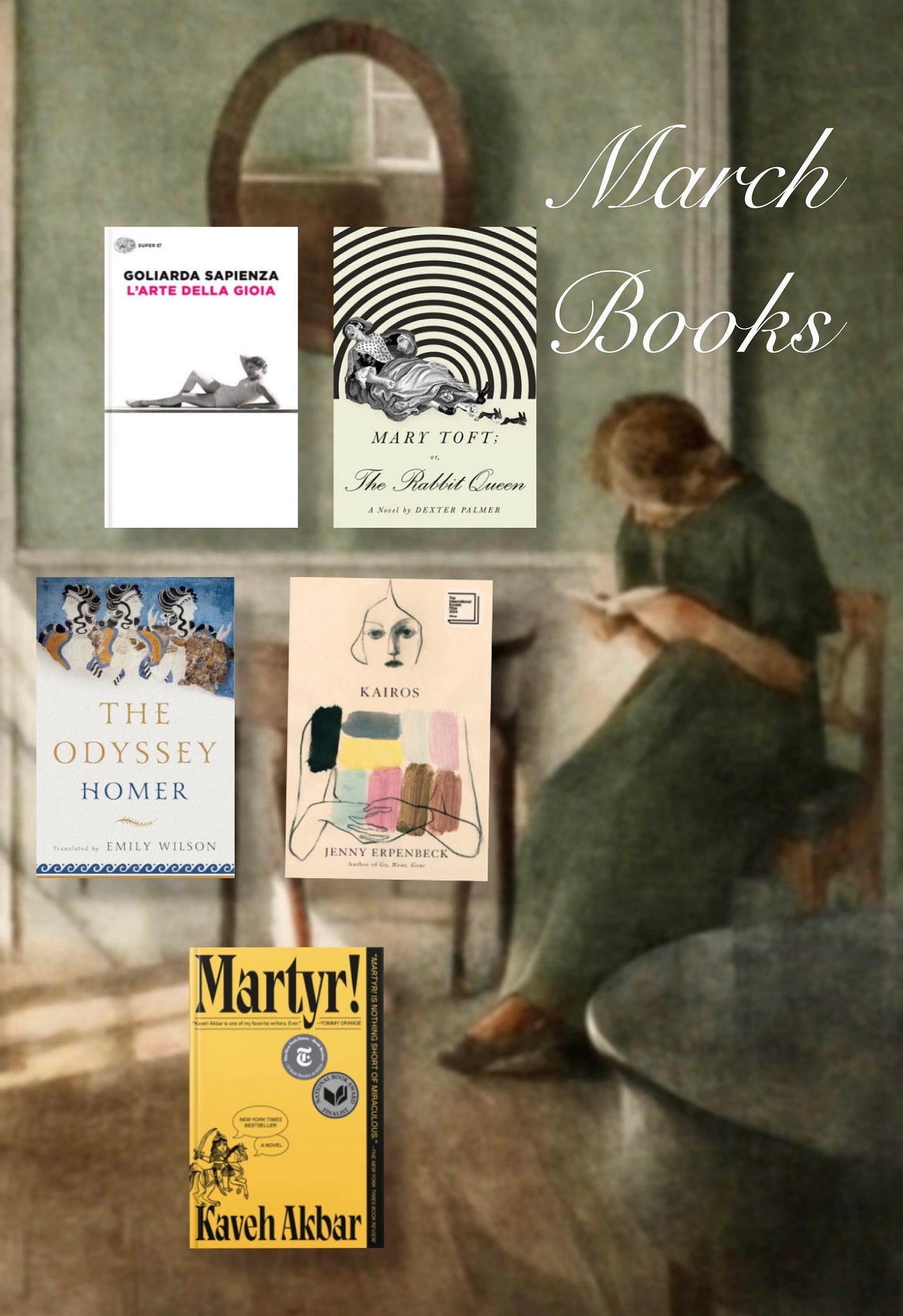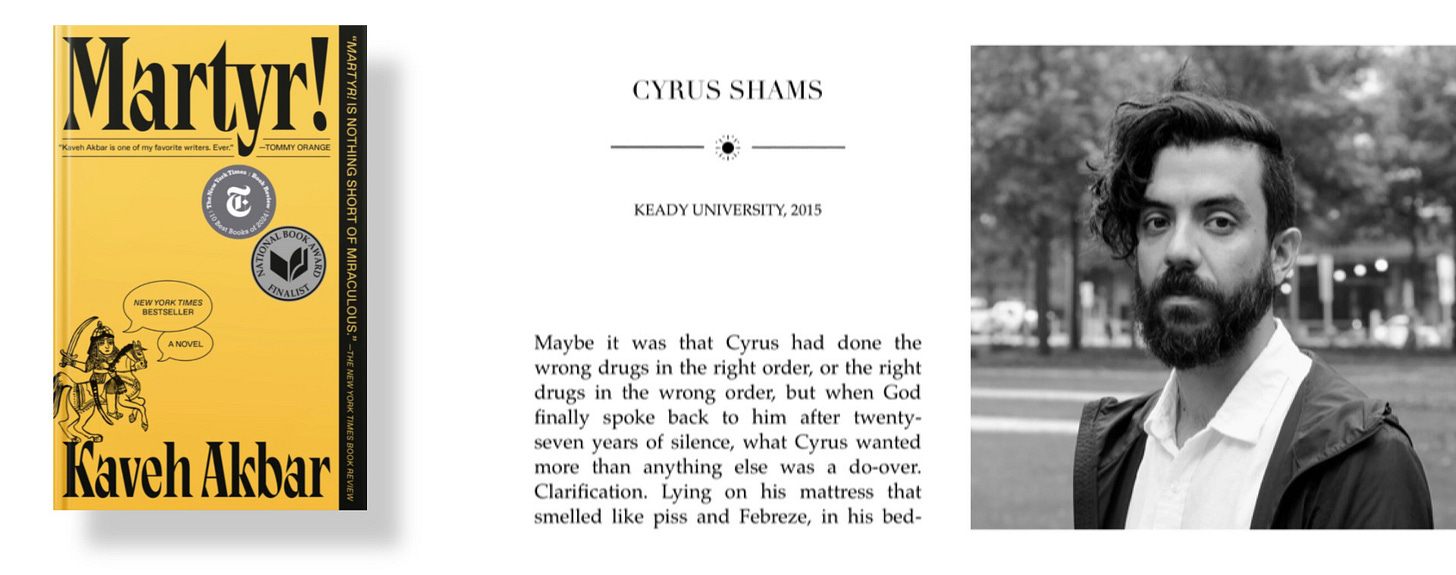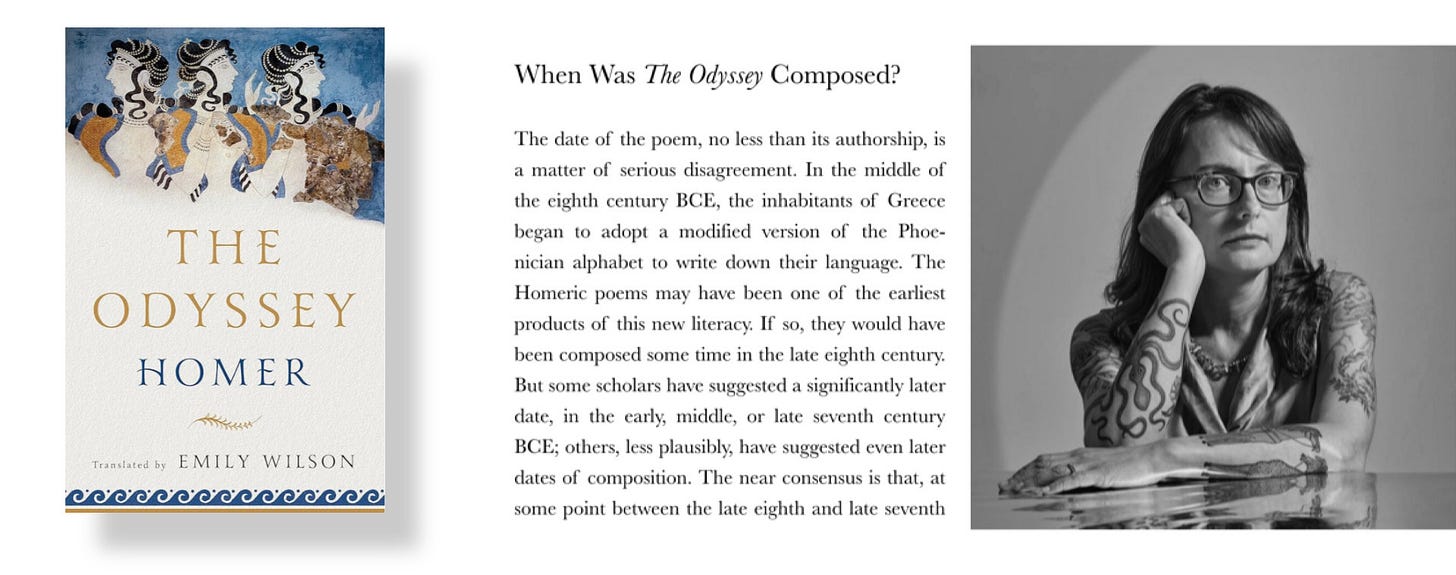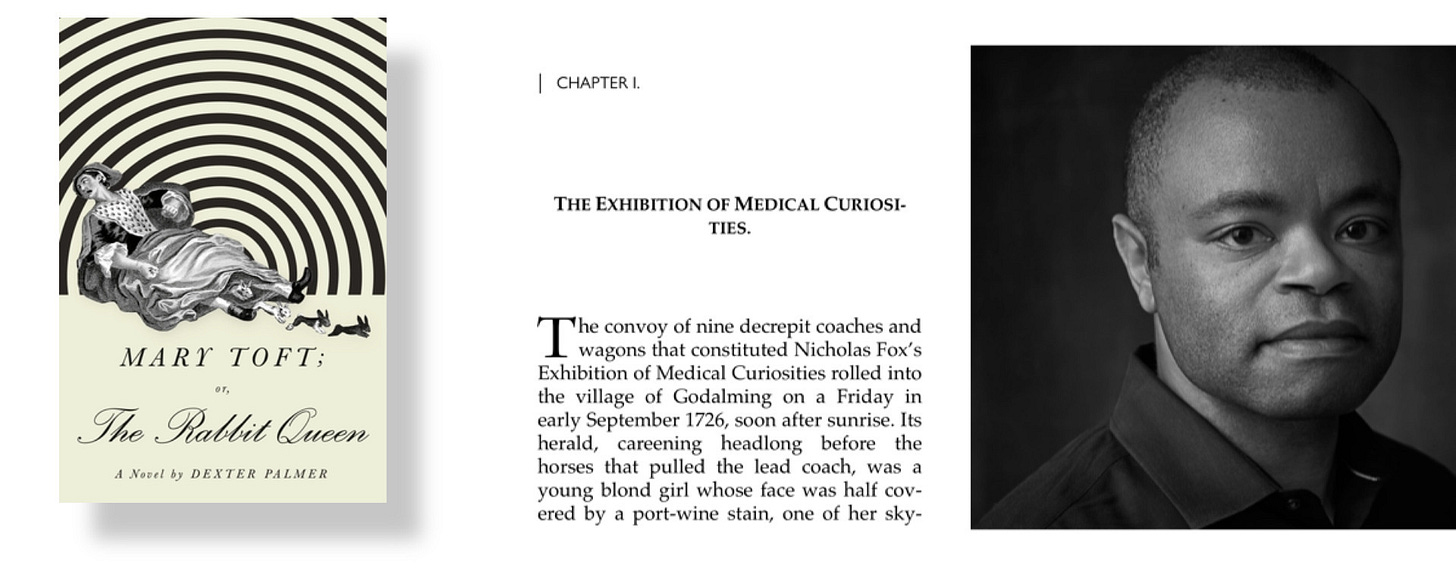Into the Archivist’s Mind: March Books
Thoughts and reflections about the five books I read in March!
This has been my best reading month of 2025 so far! With the exception of one book, I enjoyed pretty much everything I picked up and I couldn't be happier (especially considering the massive reading slump I was battling at the end of last month, as I mentioned in my February reviews)
This month I explored a lovely mix of books: one in my native language (which I really should do more often), one about a woman giving birth to rabbits (yes, you read that correctly), a famous little Greek poem… and more! I’ll leave you to it.
Here are all my thoughts.
Thank you for reading,
Ella.
Martyr! written by Kaveh Akbar.
Martyr! explores one of the most profound questions: does our life, and more importantly, our death, hold meaning?
Cyrus, born in Iran and raised in America, lost his mother in a plane crash when he was a child. This event caused by the U.S. government sparks political debates throughout the novel. Later, as a college student, he loses his father too. Struggling with work, alcohol and drug abuse, depression, and a complicated (sometimes romantic) relationship with his friend Zee, Cyrus becomes obsessed with death and its significance, asking questions like: How does one die a martyr? And how can my death hold meaning? Cyrus decides to write a book about it, when he meets a dying artist, engaging conversations and a secret are revealed...
I appreciated the depth of the story even if I didn't quite fall in love with it. The narrative is profound and Cyrus is a compelling protagonist, I suspect he reflects parts of Akbar himself, particularly in some of the philosophical debates that I found in the book. The writing is good, but I wouldn’t say it’s exceptional. There are some parts I wasn’t particularly fond of, especially the dream sequences (this might just be a personal preference, I don’t really enjoy dreams in novels, particularly when they take over entire chapters). I did enjoy the different points of view written in the first person — something Cyrus never does — there are chapters narrated by his uncle and his parents, which I found interesting and well written. There's also a twist in the book (which I won't spoil), and although I saw it coming, I might have preferred a different one. If you're looking for a thought provoking read, I would recommend this one. It can feel a bit melancholic and sad at times, but it’s the kind of book that sparks introspection and makes you wonder about the meaning of it all.
The Odyssey written by Homer, translated by Emily Wilson.
A hero's journey. Gods. Monsters. Loyalty. Betrayal. Adventure. Wisdom. A family reunited. I unexpectedly loved this. When we think about classics, we all have different opinions. Even if you haven't read them, in a way, you still know the overall story and form your own ideas about it. Over the years, I had read paragraphs and pieces of The Odyssey but I never sat down and read the whole thing. I’m so glad I finally did! Homer’s world comes alive in Wilson's translation. I found a clarity that I didn't expect. I know there’s a lot of controversy around this translation, but I wanted to trust her, and immediately after a few pages of her introduction, I knew I made the right decision. She chose accessible, simple language while still keeping the beauty and flow of the original poetry. I loved her treatment of the women in this story. Athena, Penelope, Circe, Calypso, and all the women in The Odyssey are complex, incredible, and necessary to the story. They share some clear and particularly profound characteristics: guidance and strength, intelligence, perseverance, and humanity. And I never felt that they were overshadowed by the male protagonists; this was a crucial point for me. I found Odysseus himself extremely interesting. Of course, even before you start the book, you know about his heroic character, but really, he’s just a man trying to come home. He’s very reflective and brave, and by the end of the story, I could sense his growth.
It’s hard writing a review for a classic this monumental and epic. The Odyssey is, yes, an adventure story, but it’s also a story about humans, home, the meaning of belonging to a place, and most importantly, to a person. As always, everything leads to that special little word: love.
Mary Toft; or the Rabbit Queen written by Dexter Palmer.
In a small village in 18th century England, a surgeon and his young apprentice — used to their predictable routine and standard patients — are left speechless when a woman claims to give birth to dead rabbits. Based on the true story of Mary Toft, Dexter Palmer adds sprinkles of his own ideas to this tale, exploring profound questions about science, faith, religion, and the roles women are confined to, often seen merely as vessels for childbirth. But in my view, Mary Toft is not the central character of this novel. In fact, I wouldn’t say this story has a single protagonist. We’re introduced to a cast of male surgeons and two young apprentices who, after meeting the daughter of a traveling curiosity show owner, are pulled into a world far beyond anything they’ve known. The novel’s strongest quality is Palmer’s engaging prose. His narration is smooth and compelling, and he has the ability to effortlessly draw you into this strange historical world. He takes the well known story of Mary Toft and sharpens it, making it even more gripping and interesting. Some readers might find the lack of Mary’s perspective a flaw, but I believe Palmer made the right choice. She is the heart of the story, yes, but only a few chapters are written from her point of view. I personally think giving her more space could’ve risked overshadowing the mystery at the core of her story. With his narrative choices, I remained perplexed and intrigued until the end of the book. Loved this!
Kairos written by Jenny Erpenbeck.
This was my only letdown of the month, unfortunately! I found Kairos emotionally detached, and the exploration of the tumultuous relationship between Hans, a 50 year old man, and Katharina, a 19 year old woman (which spans a decade in post-war Germany), toxic and honestly, not even that interesting. Hans in particular, is insufferable, and the narrative never seems to acknowledge the unhealthy state of this relationship. I did enjoy the structure of the novel — Katharina shares her memories after Hans’s death using what is essentially a memory box — but something felt off. Erpenbeck’s use of present tense narration without quotation marks for dialogue is a stylistic choice I personally detest. It worsens the book and makes it feel even colder than it already is.
The novel revolves around themes of obsession, memory, identity. The political context of Germany’s history adds layers to the story but it often feels secondary to the cold and, quite frankly, boring relationship itself. I didn’t hate it (I know it seems like I do!), I just didn’t feel much of anything either.
L’arte della Gioia written by Goliarda Sapienza.
L’arte della Gioia, set in 1900s Sicily, is an intriguing and fascinating novel that’s hard for me to categorize. It’s historical fiction, drama, and romance. It follows the life of Modesta, a poor little girl who, after being abused and losing her mother and sister, is sent to a convent. There, she forms a close bond with the superior, Mother Leonora. Her influence will shape Modesta's future. The years pass and by the time she’s a teenager, she’s sent to live with a noble family, where her true self begins to emerge. Modesta is no saint: she’s stubborn, fierce, and often far from altruistic. I found myself interested in her and her complexity. I loved reading about her, even though the narrative occasionally shifts between first and third person perspectives, which I didn’t love. The writing, overall, wasn’t my favorite, but I enjoyed the novel’s political elements, an important reflection on the social climate at the time. Modesta’s relationships, both with men and women, are central to the story, as is her sexual awakening at a young age. Maybe after her fourth lover it became a little repetitive and even if she’s so full of life, and yes, joy, I couldn’t help but wonder: does she love someone, or is she only interested in being loved? Her strength and perseverance in seeking a better life for herself, even at the cost of others, are important aspects of her character. The novel is divided into four parts and while I adored the first two, the last two felt almost like an entirely different book. By the end I just found myself tired, as the narrative became a little heavy. But as I said, the first 300 pages were a brilliant and unforgettable experience, making the novel worth reading. The troubled story behind the book’s publication is also important. I would recommend reading about it before diving into the story Sapienza wanted to tell!









